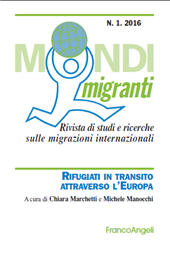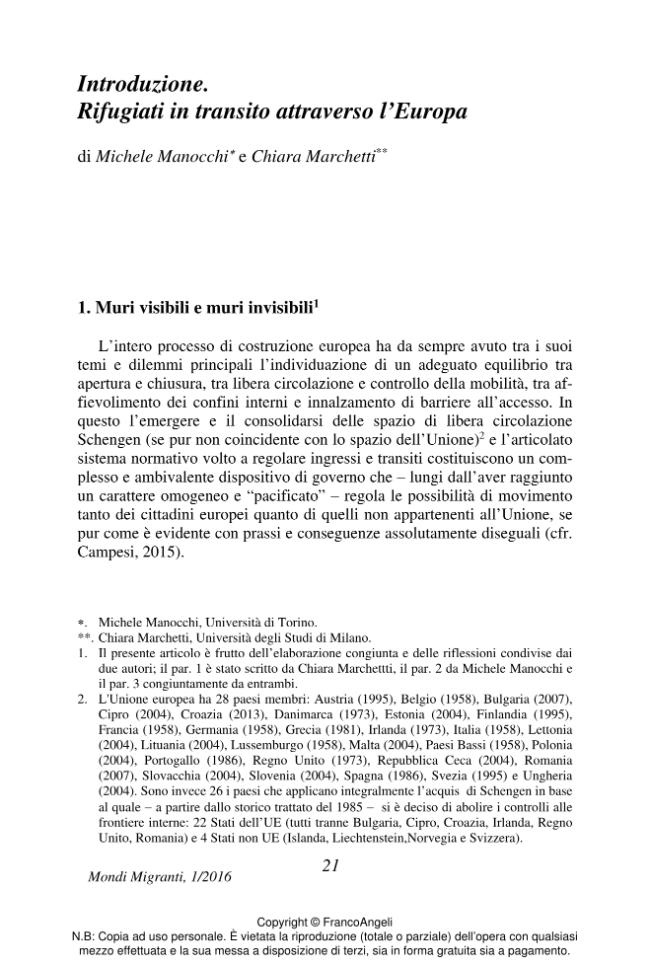2016 - Franco Angeli
Artikel
Digital Version
Herunterladen | Kopieren/Einfügen | Drucken
Introduzione : rifugiati in transito attraverso l'Europa
21-38 p.
- L'articolo mette in luce la complessità del fenomeno delle migrazioni forzate e della sua gestione da parte di attori istituzionali in Europa. L'obbiettivo dell'autrice è quello di evidenziare le relazioni di potere e le frizioni che emergono dall'interazione tra i sistemi di controllo e gestione delle migrazioni e i tentativi di muoversi autonomamente messi in atto dai soggetti migranti. Verrà utilizzato il concetto di soggettività, che permette di indagare gli effetti delle relazioni di potere e le pratiche di costruzione del sé messe in atto dai soggetti dentro i limiti e le costrizioni strutturali in cui si muovono. Queste dinamiche verranno rappresentate attraverso il caso-studio etnografico di "secondi movimenti" di un gruppo di migranti forzati approdati in Italia nel 2011 e trasferirtisi successivamente in Germania, alla ricerca di condizioni migliori di vita, nonostante le limitazioni ai loro movimenti imposte dagli accordi di Schengen e Dublino. I soggetti migranti vivono così una condizione di tran
- sito prolungata nel tempo, che assume una dimensione sia spaziale, che temporale e giuridica - categorie che transitano dalla condizione "illegale" a quella "legale" e viceversa - divenendo essa stessa parte integrante dell'esperienza migratoria e non più solo una fase di passaggio. Si sviluppano così soggettività in movimento caratterizzate da temporalità in transito, che si incontrano e scontrano con le istituzioni europee, nazionali e locali. Le frizioni che emergono da questi incontri mostrano come l'Europa sia un campo di battaglia, dove pratiche di negoziazione tra soggetti migranti, attori istituzionali e gruppi di supporto, contribuiscono alla ridefinizione dei confini territoriali, giuridici e politici.
- The article highlights the complexity of the forced migration phenomenon and the way through which the institutions attempt to manage and control it in Europe. The author sheds light on the power relations and the frictions that emerge from the interaction between the system of migration control and the migrant subjects' attempt to autonomously move. The concept of subjectivity is here applied in order to grasp the effect of the power relations and the practices of self formation enacted by subjects within the structural constrains in which they move. These dynamics will be highlighted by an ethnographic case-study about the "secondary movements" of a group of forced migrants that arrived in Italy in 2011 and moved later to Germany in order to find better life conditions, despite the restriction of their mobilities through the Schengen Agreement and Dublin Convention. The migrant subjects experience thus a transit condition, which is lengthened in time and assumes a spacial, temporal and juridical dimension -
- categories in transit from the "illegal" condition to the "legal" one and vice versa. Hence the transit condition becomes integral part of the migratory experience and not just a phase of transition. Thus, subjectivities in movement emerge, which are characterized by transit temporalities that confront themselves with the European, national and local institutions. The frictions which emerge from these interaction shed light on Europe as a battleground, where the negotiating practices between migrant subjects, institutional actors and supporters contribute to the redefinition of the territorial, juridical and political borders.
Ist Teil von
Mondi migranti : 1, 2016-
Informationen
ISSN: 1972-4896
KEYWORDS
- Transiti, confini, migrazioni forzate, soggettività, temporalità, secondi movimenti
- Transits, borders, forced migration, subjectivities, temporalities, secondary movements
-
In derselben Datei
- La prova della soglia : migranti africani tra mobilità e immobilizzazione
- Introduzione : rifugiati in transito attraverso l'Europa
- Soggettività en transit : (im)mobilità dei rifugiati in Europa tra sistemi di controllo e pratiche quotidiane di attraversamento dei confini
- Mobilità intra-europea : il caso dei movimenti di ritorno a Torino di migranti titolari di protezione umanitaria
- L'armonizzazione della procedura di decisionmaking nel Sistema Europeo Comune d'Asilo : il Sig. J. aveva ragione?
- I rifugiati siriani sulle rotte via mare verso la Grecia : riflessioni sul transito e sullo svuotamento del diritto d'asilo
- Stranieri cinesi e accesso ai servizi sanitari : i risultati di uno studio a Messina
- Migration and work : the cohesive role of vocational training policies
- Voyages méditerranéens, écritures francophones : entre départ et retour, les premières beurettes à la recherche de leur identité
- She's leaving home : donne europee che migrano nello stato islamico
- Recensioni
- Piazza delle lingue 2015 : l'italiano del cibo, 30 settembre-2 ottobre 2015, Sala Buzzati, Milano



